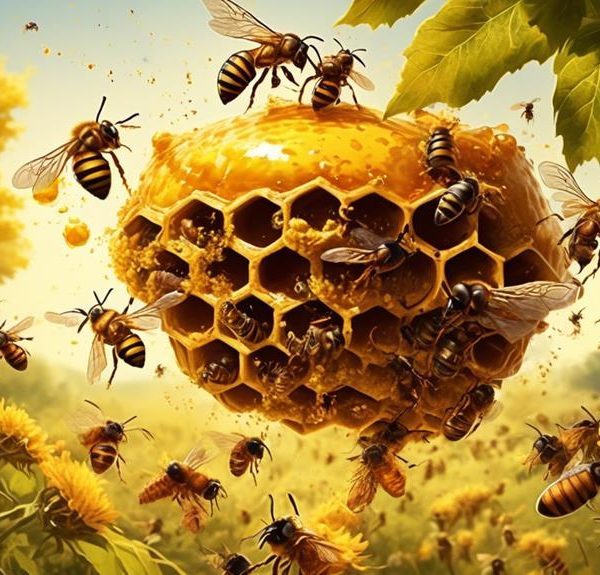Knowing your dog's diet is vital; learn about the benefits and potential risks of feeding them honey, and keep them healthy and happy.
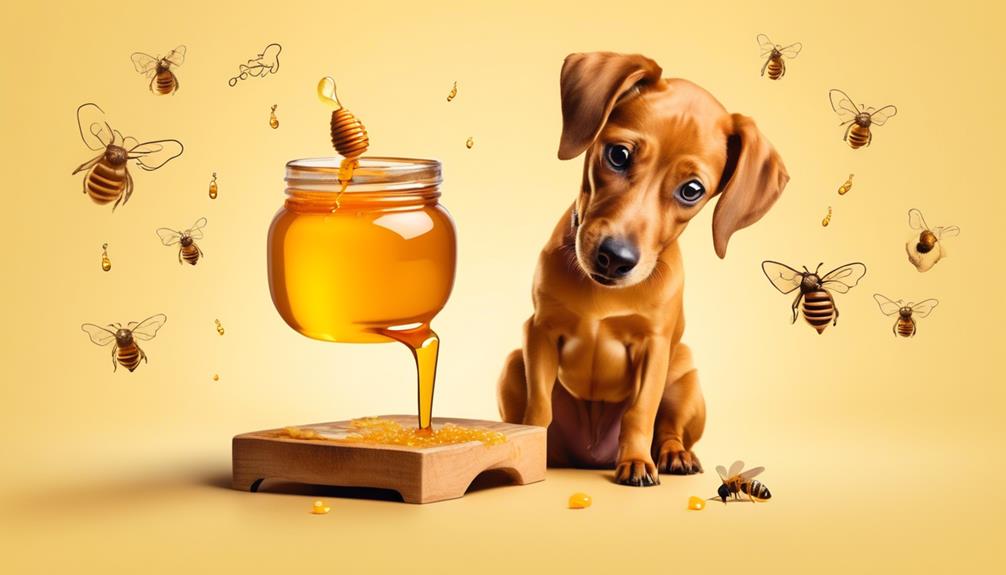
Are Dogs Allowed to Eat Honey?
You might be surprised to learn that honey isn't just a sweet treat for humans, but can also be beneficial for our canine companions. As a dog owner, you're probably accustomed to scrutinizing the ingredients in your pet's food to ensure it's healthy and safe.
This naturally leads to the question, 'Can dogs eat honey?' Although honey is generally safe for dogs, there are a few considerations to keep in mind. With its natural sugars and nutrients, honey can offer health benefits, yet it's not without its potential risks.
Intrigued? Let's explore the ins and outs of dogs and honey further.
Key Takeaways
- Dogs can benefit from the vitamins, minerals, and healing properties found in honey.
- Feeding dogs honey should be done in moderation to avoid health risks like obesity and diabetes.
- Raw honey may contain harmful bacteria, so caution is advised when offering it to dogs.
- It's important to consider a dog's size, weight, and health status when determining the appropriate amount of honey to feed them.
Understanding a Dog's Digestive System
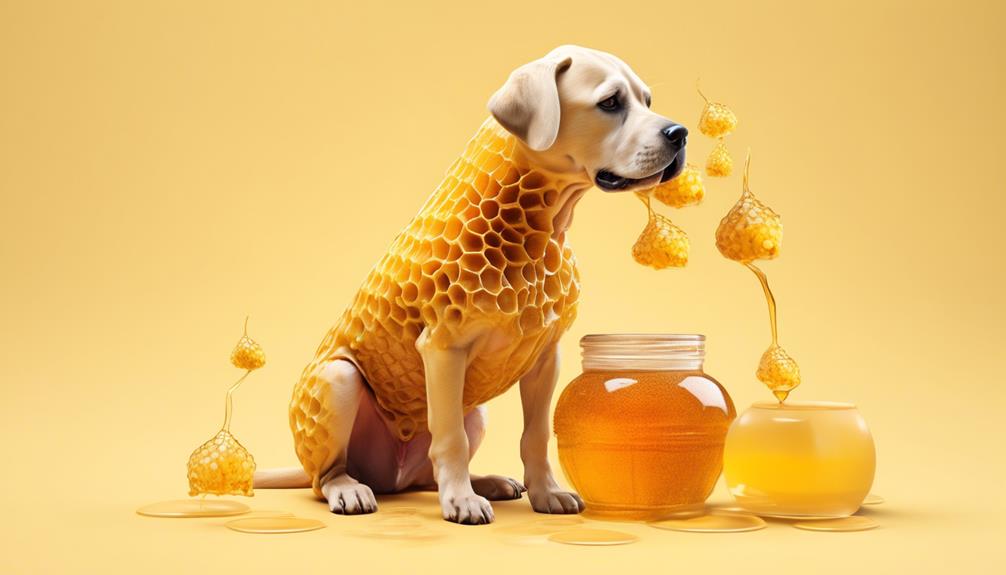
While it's crucial to understand what foods are safe for your dog, it's equally important to grasp how a dog's digestive system works. Unlike humans, dogs have a shorter digestive tract and a higher acidity level in their stomach, which allows them to break down food more quickly.
When your dog eats, food travels down the esophagus into the stomach, where strong gastric juices start the digestion process. Proteins begin to break down into amino acids, and fats are emulsified. The food then moves into the small intestine, where the nutrients are absorbed into the bloodstream.
The liver plays a critical role too, as it filters out toxins and produces bile to help digest fats. What your dog can't digest moves into the large intestine, where water is absorbed, and the remaining waste forms into feces.
Understanding this process helps you make informed decisions about your dog's diet. Though dogs can handle a variety of foods, some substances can disrupt their digestive system or even be toxic. That's why it's essential to know what's safe for your dog to consume, like honey, and what isn't.
Health Benefits of Honey for Dogs
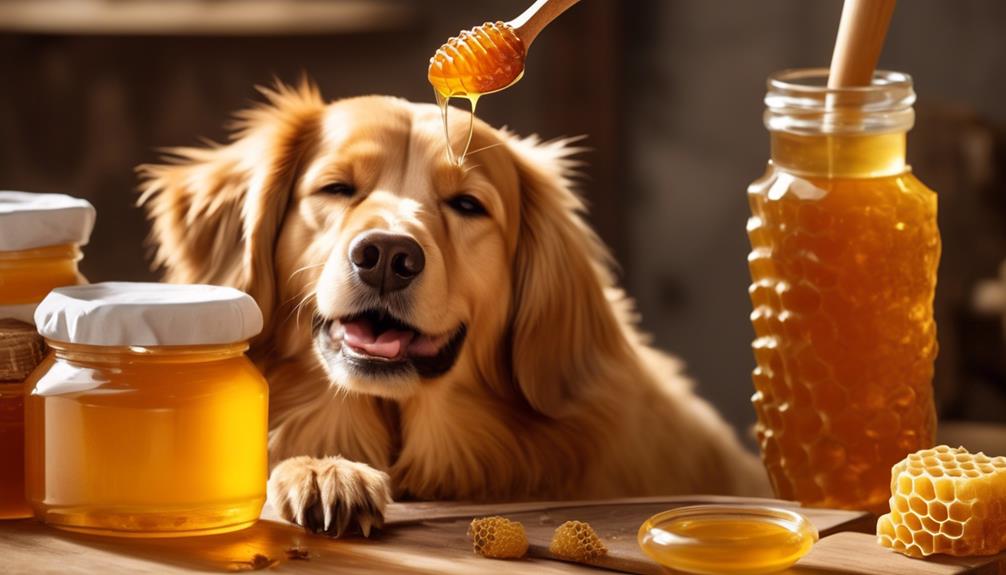
Now that we've explored the workings of a dog's digestive system, let's turn our attention to the potential benefits of honey in a dog's diet. Honey is rich in nutrients like vitamins A, B-complex, C, D, E, and K, plus minerals like potassium and magnesium. These nutrients can support overall health and well-being in dogs.
Honey also has antibacterial, anti-inflammatory, and antioxidant properties, which can help combat various health issues. For instance, the antibacterial properties can aid in the healing of wounds and skin conditions. The anti-inflammatory properties may alleviate symptoms of allergies by reducing inflammation in the body. The antioxidants in honey can combat oxidative stress in your dog's body, potentially helping to prevent chronic diseases.
Moreover, honey can act as a digestive aid. It contains enzymes that assist in the digestion process, potentially reducing the risk of indigestion or other gastrointestinal issues. A small amount of honey might also soothe a dog's sore throat or reduce coughing.
However, remember to use honey sparingly due to its high sugar content. Always consult your vet before introducing new foods into your dog's diet.
Potential Risks of Feeding Honey to Dogs
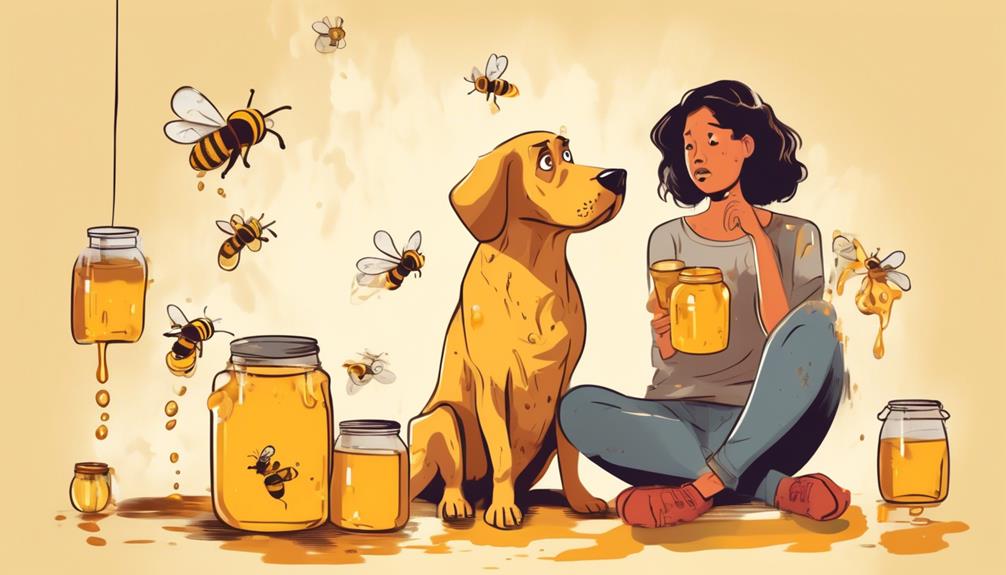
Despite the potential benefits, there are several risks associated with feeding your dog honey, particularly in large quantities. Honey is high in sugar, which can lead to obesity and diabetes in dogs if consumed excessively. It's important to remember that a dog's digestive system is different from ours; they can't process sugars like we can.
Another risk is that honey, especially raw honey, can contain bacteria and fungi, including Clostridium botulinum. This bacterium produces a toxin that can cause botulism, a serious and potentially fatal illness in dogs. Puppies, elderly dogs, and those with compromised immune systems are particularly susceptible.
Honey could also cause allergic reactions in some dogs. Symptoms may include itching, swelling, sneezing, or difficulty breathing. If you notice these signs after giving your dog honey, stop feeding it immediately and consult your vet.
Furthermore, honey's sticky consistency might cause dental problems. It can adhere to your dog's teeth, promoting plaque build-up and tooth decay.
Recommended Honey Intake for Dogs
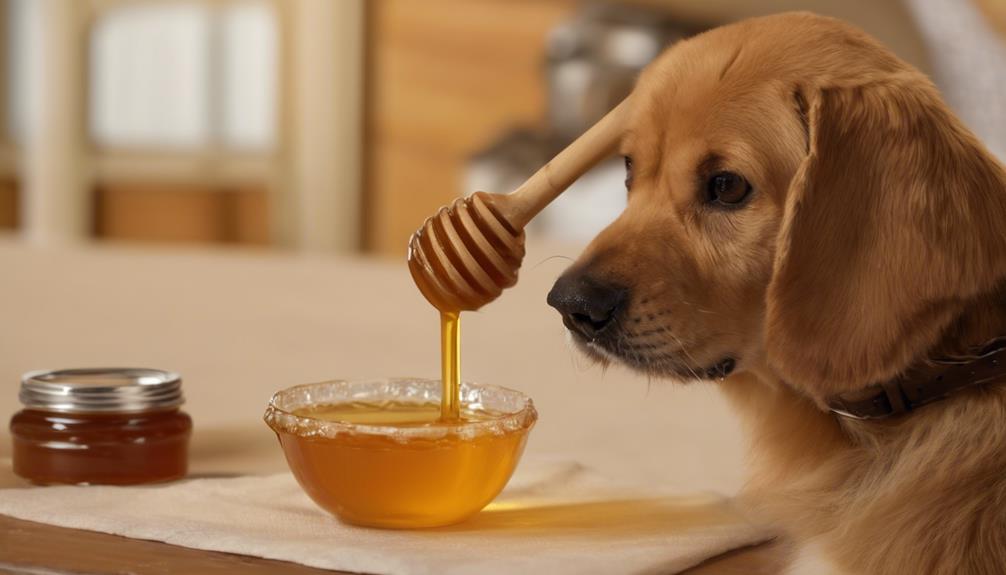
Given these potential risks, it's crucial to understand how much honey is safe for your dog to consume. Generally, it's recommended that smaller dogs should ingest no more than a teaspoon of honey per day, while larger dogs should limit their intake to two teaspoons. However, these are merely guidelines and the actual amount can vary depending on your dog's size, weight and overall health.
Size of Dog | Maximum Daily Honey Intake | Reasoning |
|---|---|---|
Small Dog (10 lbs or less) | 1/2 teaspoon | Due to their small size, excessive honey could lead to weight gain and dental problems. |
Medium Dog (10-50 lbs) | 1 teaspoon | Medium dogs can tolerate a bit more honey, but moderation is still essential. |
Large Dog (50 lbs or more) | 2 teaspoons | Larger dogs can handle more honey, but it should still be limited to prevent health issues. |
Alternatives to Honey for Dogs

In light of potential health risks associated with honey, you might consider safer and equally nutritious alternatives for your furry friend. Many dog owners opt for fruits like apples, pears, and bananas, which are packed with essential vitamins and fiber. They're also low in fat and cholesterol, making them a healthier choice.
However, it's crucial to remember that not all fruits are safe for dogs. Grapes, raisins, and cherries can be harmful, so always double-check before introducing a new food into your pet's diet. It's also essential to remove any seeds or pits, as these can pose choking hazards or contain toxic substances.
For a more direct substitute, consider natural sweeteners like stevia or xylitol. However, be aware that xylitol, while safe for human consumption, is extremely toxic to dogs. Therefore, stevia remains the safer option.
Unsweetened pumpkin puree is another healthy substitute for honey. It's rich in fiber and vitamin A, which can aid in digestion and promote good eye health.
Remember to introduce any new foods gradually, monitoring your dog's reaction closely. It's also always a good idea to consult your vet before making any significant changes to your dog's diet.
Conclusion
In conclusion, your furry friend can indeed enjoy honey, given its various health benefits. But remember, moderation is key due to its high sugar content.
Always monitor your dog's reaction to honey and consult a vet for the best dosage. If your pooch is diabetic or obese, consider healthier alternatives.
Remember, every dog is unique, so use your judgement and knowledge of your pet to make the best decision.

